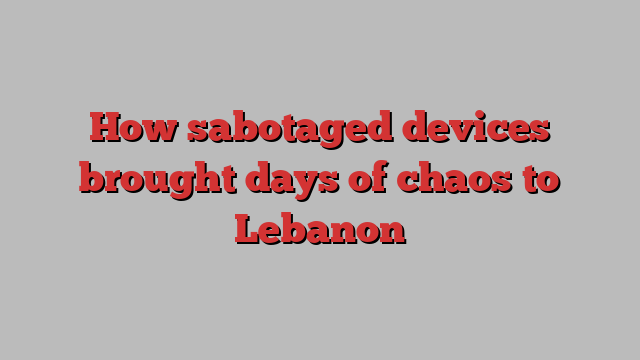
Cigarette smoke and low chatter filled the air as hundreds gathered in Beirut’s southern suburbs on Wednesday afternoon to pay their respects to four people killed in the brazen pager attacks that rocked the country the day before.
Weeping mourners wore badges bearing the faces of the 12 people killed in the co-ordinated blasts, among them an 11-year-old boy whose coffin was to be paraded through the winding streets of the working-class neighbourhood from which Hizbollah draws support.
Attendees tried to process the chaos and violence that had ripped through the country as thousands of pagers used by Hizbollah operatives blew up when — according to two people familiar with the group’s preliminary investigations — a coded message triggered the mass detonations of explosives implanted into the devices, causing mayhem.
But before the ceremony even started, it was interrupted by a sudden boom: a blast in the middle of the throng, which triggered a rush of panicked mourners. “It exploded in his hand,” one man shouted as he ran through the crowd.
It was the first indication of another deadly wave of blasts. Within the hour, it became clear that hundreds of handheld radios used by Hizbollah operatives had also detonated around the country, dealing the group a new and devastating blow. For the second day running, the sound of ambulance sirens soon overwhelmed the city.
Though many of the devices belonged to militants, the thousands of explosions in public locations sent terror through the broader population of a country that has already been gripped by 11 months of relentless fighting, and heightened already pervasive fears of a full-scale conflict with Israel.
Hizbollah has blamed the device explosions on Israel, which has not commented on the claim.
At the funeral, as elsewhere, men were seen emptying the batteries out of walkie-talkies that had yet to explode, throwing them into bins and ditches. Many parents across the country unplugged their devices — baby monitors, iPads, home security systems — just in case they too could be rigged with explosives. Some children refused to take their phones to school, telling their parents they did not want to die.
The blasts caused deaths — 12 on the first day and 25 on the second — and also maimed thousands of people. Across the two days, nearly 3,000 people were injured, with hundreds requiring intensive care.
“I thought Tuesday was the worst day of my career so far,” said a nurse at Bahman hospital in Beirut’s southern suburbs. “But then came Wednesday and another conveyor belt of people with these horrible injuries — it’s like we lived a nightmare on repeat.”
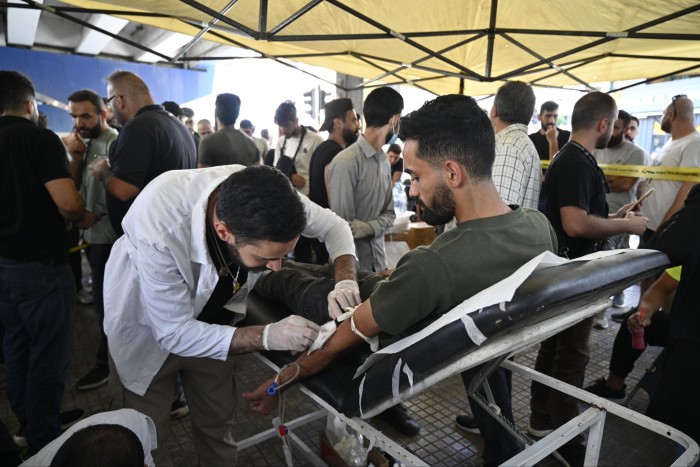
Lebanese across the country, including in areas openly hostile to Hizbollah, heeded hospitals’ desperate pleas for blood donations, prompting what the militant group’s chief Hassan Nasrallah praised on Thursday as the largest blood drive in the country’s history.
Nasrallah thanked Lebanese people for their solidarity — “far from sectarian or political considerations” — while the attacks, unusually, sparked condemnation across Lebanon’s divided political spectrum.
The rare unity spoke to the wide reach of the consecutive attacks. The pagers were detonated suddenly across a country already blighted by years of political and economic crisis, disrupting daily lives as people shopped for bathroom tiles, ate at seaside restaurants and picked up their children at nursery gates.
Many of the people carrying pagers were affiliated with Hizbollah — which is the dominant political force in Lebanon as well as a militant group — but were not fighters, working in hospitals or one of the group’s other influential civilian institutions. Some fighters hold day jobs or were at home with their families when the blasts took place.
In one village in the south, a man was unmasked as a Hizbollah informant when both of his hands were blown off as he attempted to throw his detonating pager far away.
At least one woman and two children were killed in Tuesday’s detonations. It is not clear how many civilians with no link to Hizbollah were injured.
The youngest victim of the attacks was Fatima Abdullah, aged nine, who was doing her homework after her first day of the school year when a nearby pager exploded. Her family rushed in at the sound of the blast and found Fatima lying on the couch, dead, her aunt told a Lebanese newspaper.
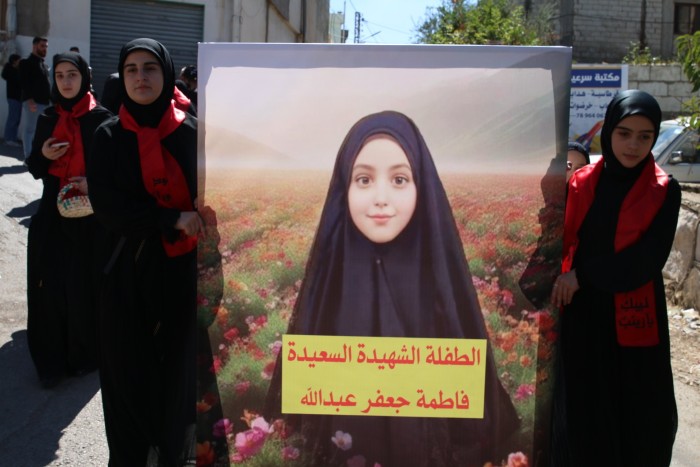
The second day of explosions sent casualties pouring into hospitals already overwhelmed by patients with injuries to the face, eyes, hands, legs and flanks from the day before. Some were forced to send the newly injured to hospitals further away.
As the chaos began on Tuesday afternoon, young heart doctor Jimmy Abou Khalil raced to the Hotel Dieu hospital in central Beirut, where he works. There he found the wards overflowing with people maimed by the pager explosions. The attacks left a trail of strange and specific injuries: Abou Khalil said he saw hands stripped down to the bones by the explosions, requiring amputations.
“I didn’t know where to start, who to treat first,” he said, comparing the “catastrophe” to the 2020 Beirut port blast, which killed more than 200 people, injured thousands and destroyed swaths of the city.
The exploding pagers sent shrapnel ripping through people’s eyes as they looked at their devices; three-quarters of patients at his hospital lost at least one eye, Abou Khalil said. The specialist eye hospital down the street was overwhelmed by injured people, with new patients still arriving as late as Thursday afternoon. Lacking enough facilities to treat so many ocular injuries, Lebanon sent a plane full of men — hauntingly bandaged and bloodied — to Iran for specialist care.
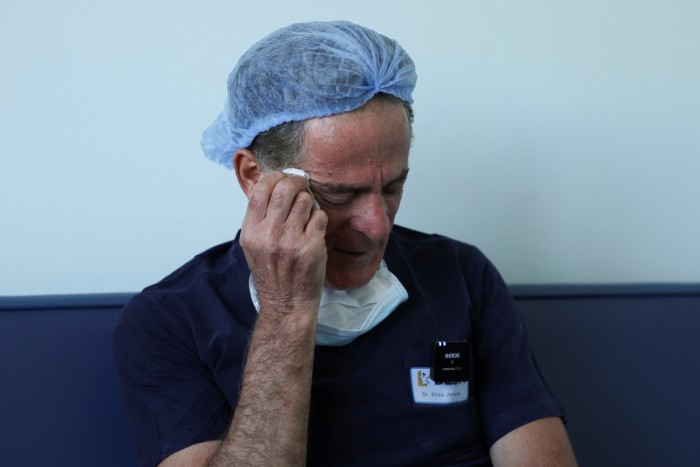
Managing a snack shop in central Beirut, Abou Al-Michi tried to sum up the mood after spending two days watching ambulances rush past his windows. “It was a silent earthquake,” he said. “It came to the country like a cancer to the body.”
By Thursday Beirut’s streets, usually teeming with people, were empty, and some shops were shuttered. Employees at several electronics shops around the capital nervously opened their doors.
But in some parts of the city, a typically Lebanese, defiant quasi-normality took hold. Children were already back in the classroom just a day after the first round of blasts shut schools on Wednesday.
Zeina, who waited outside her child’s school, said she did not hesitate to send them back to class. “We’re used to this in Lebanon — we’ve seen wars, even our children have now seen a year of war,” she said. “What are we going to do, just stay home?”
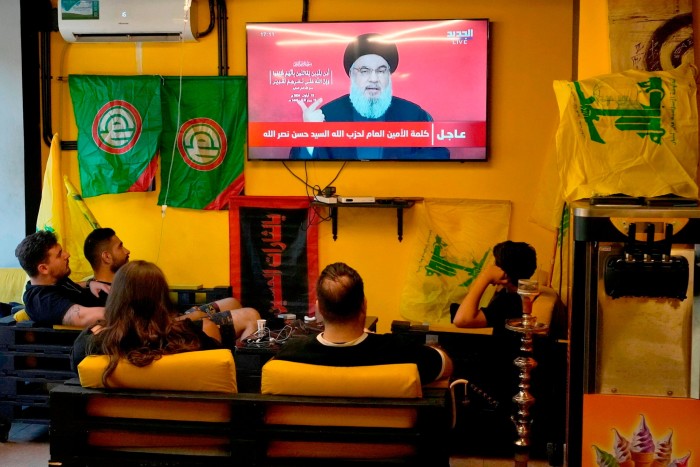
Anxieties were somewhat quelled by a relatively muted Nasrallah, who addressed the nation on Thursday evening vowing retribution. But experts say the group is backed into a corner and is unlikely to be able to respond rapidly.
While Nasrallah insisted the group was unbowed by the near-destruction of its communications systems, the organisation was undeniably shaken by this week’s events, people familiar with the group’s thinking said. Even as Nasrallah spoke, sonic booms shook Beirut and Israel launched widespread air strikes near Lebanon’s southern border.
Beyond grappling with the impact on their communications networks, the organisation must rehabilitate hundreds of members who were most severely wounded in this week’s attacks, and reconstitute its ranks. But Hizbollah has already lost hundreds of men since October, and experts agreed that the loss of manpower was far from a death knell for the group.
Still, said one of the people familiar with the group’s thinking: “They need time to recuperate and understand what the hell just happened to them.”